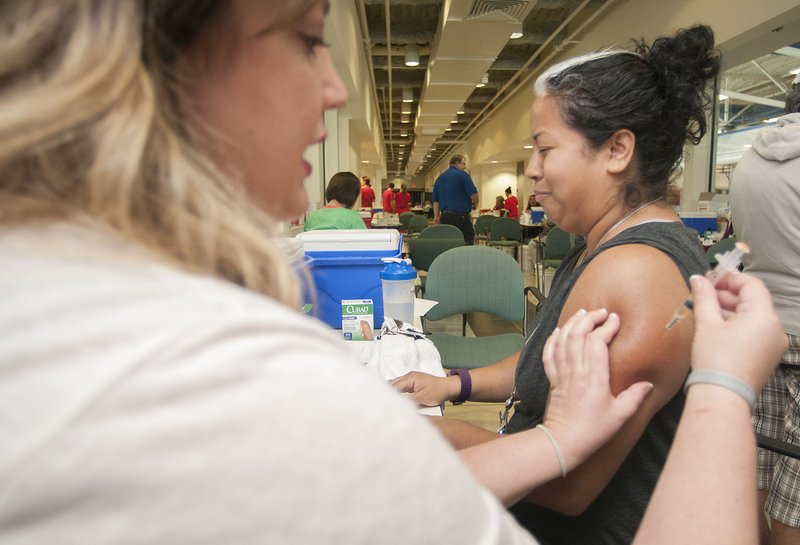SPRINGDALE -- The number of new mumps cases in Arkansas is the lowest since the outbreak began in August, according to the Arkansas Department of Health.
March has averaged about two new cases per day, the department's tally shows.
On Wednesday, only six counties in the state had mumps cases -- Benton, Carroll, Washington and Madison in Northwest Arkansas; Sevier in southwest Arkansas; and Greene in the state's northeast.
At the peak of last year's outbreak, cities and school districts in more than 30 counties had active cases.
The 2,898 current number of cases is still high compared with typical years, when only a handful of people throughout the entire state showed symptoms of the virus. Mumps symptoms include aches and fevers, and swollen salivary glands, and the virus is spread primarily through coughing and sneezing.
Roughly half of the nation's mumps cases since the beginning of 2016 were in Arkansas, according to figures from the federal Centers for Disease Control and Prevention in Atlanta.
"We were real worried, when we started to see it spread out geographically, that it would begin to take hold somewhere," Dr. Dirk Haselow, state epidemiologist, said late last month. That hasn't happened, he said, which is "very, very good."
The turning point appears to have been in late December, Health Department data show.
Springdale was especially hard-hit during the outbreak last year.
Two of Kejjo Clarence's four children showed signs of the virus in late December and had to be confined to their rooms for several days. Clarence, president of a Marshallese Church of Latter-day Saints in Springdale, said that at one point half of his 160 or so church members where home sick with the virus.
"Now it's almost gone, and everyone's feeling good," he said.
Springdale was the epicenter of the outbreak. The Health Department said the first case seemed to have come from a visitor from Iowa.
Dozens of schools in Northwest Arkansas reported cases. Under state law, infected children who aren't fully vaccinated for religious or medical reasons or because of their parents' preference have to stay home for almost a month. The virus can linger in the body for around 26 days.
Springdale Public Schools spokesman Rick Schaeffer said recently that what was at one time a weekly topic at administration meetings hasn't come up in "quite a while."
There's no treatment to shorten the course of mumps. However, two doses of a vaccine developed about five decades ago can protect nine in 10 people who are exposed to the virus, according to the CDC. A vaccinated person can catch the mumps, but their symptoms are generally less severe, the Health Department said.
Almost all of the children and about one-third of the adults who caught the virus in the recent outbreak were vaccinated, so the department is studying whether the vaccine is less effective against one particular variety of mumps and whether people need third doses or booster shots to get better protection.
The results of that study probably won't be released until the current outbreak is officially over, Haselow said.
He said early results are encouraging. A third dose of vaccine cut infection rates in half, he said. After 26 days, groups that received third doses had no new cases.
"That is fantastic," Haselow said. "What that doesn't demonstrate is whether that intervention is cost-effective, and we are looking into that as well."
Meanwhile, the state will continue reaching out to adults who went through school before the two-dose vaccine became the norm, and encourage them to get the shots, said Dr. Gary Wheeler, the department's chief medical officer.
The Health Department doesn't track the number of adults in the state who've been vaccinated. The CDC recommends one or two doses for adults up to age 60, depending on their circumstances.
Metro on 03/27/2017
